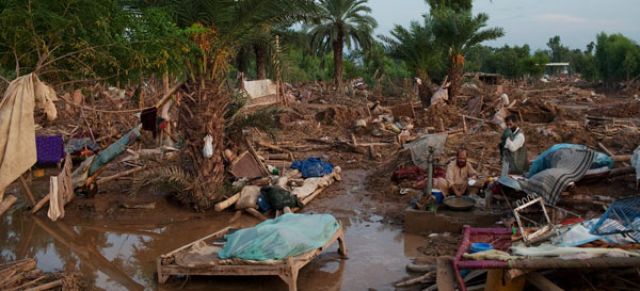
On July 29, our Labour Relief Committee team found Pir Sabaq, Khyber-Pakhtoonkhwa province, with a population of more than 34,000, completely destroyed by the flood.
A tent city of more than 1000 tents has been established but most of the people are still forced to live in partially destroyed homes. This could lead to a major building collapsing at any time, with further loss of lives.
In addition to losing their homes, most people have found their household items have been swept away. They have lost their cattle and goats as well. People are without anything to eat, drink or wear.
Pir Sabaq is mainly a town of working-class people who work in marble or stone-crushing factories, or in the construction sector or agriculture. When we visited, local people told how water more than 14 feet (4.27 metres) high reached the town’s rooftops. The flood came about 4am, while people were sleeping, so there was no chance to save anything but their lives.
The owners of small tourist boats did their best to help save lives of other people.
By contrast, when army helicopters arrived at the scene, they began evacuating the families of military men and residents of the big houses. People immediately saw the way the army discriminated about who they helped. People told the Labour Relief Committee team that many stranded on the rooftops of their houses waved their hands in the air when they saw the army helicopters coming, but it was of no use.
People have also blamed the government for failing to warn them in time about the danger of the flood. Some also alleged that water was allowed to flow from the Warsik dam to save the nearby military camps.
We saw the house of Pervaiz Lala, general secretary of the Labour Party Pakistan in Pir Sabaq. It was completely destroyed. Like most people in the town, he and his family are now homeless. He told us the people did not eat for almost three days after the flood.
Not a single governmental official has visited the area so far. The information minister of Khyber-Pakhtoonkhwa province, Mian Iftikhar Hussain, stated in clear terms that the provincial government cannot do anything to help people in this disaster. However, two days before, an NGO started providing some food.
There is still water all over Pir Sabaq. A bad smell is everywhere and no clean drinking water is available. Children are suffering from diarrhoea and skin rashes. The local government dispensary, the only medical facility for the townspeople, has been totally destroyed. In this environment, people are haunted by the possibility of disease.
People now are in need of food items like cooking oil, wheat flour, milk, sugar and vegetables, and clean drinking water, clothes, tents, cooking utensils and medicine.
[Farooq Ahmad is a member of the Labour Party Pakistan federal executive committee and led an LRC team in Khyber-Pakhtoonkhwa province. Reprinted from www.laborpakistan.org .]